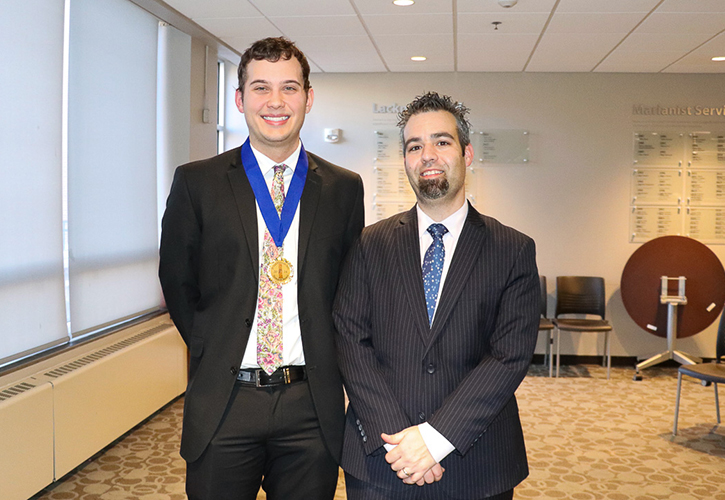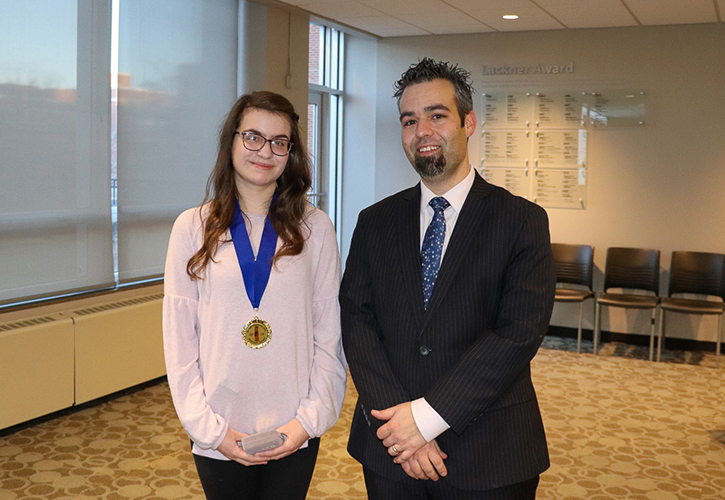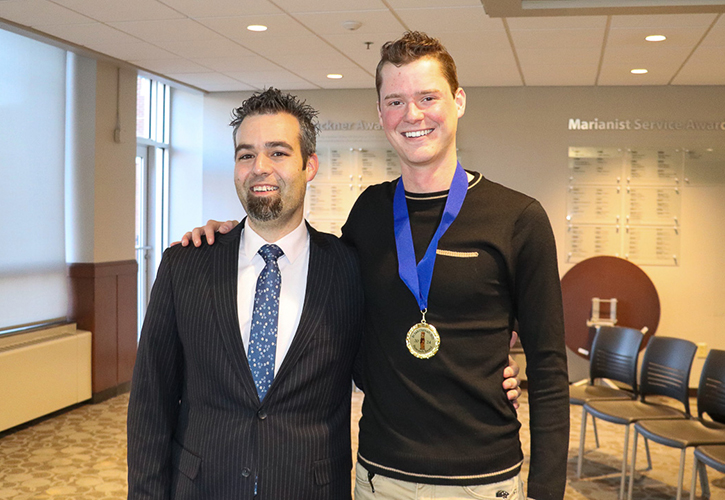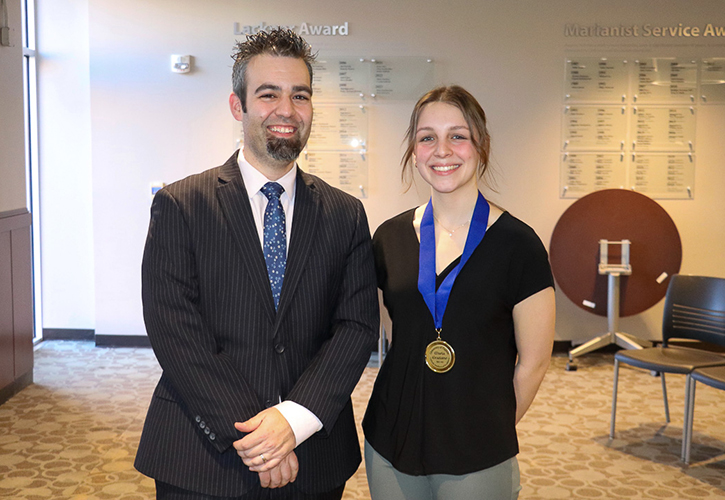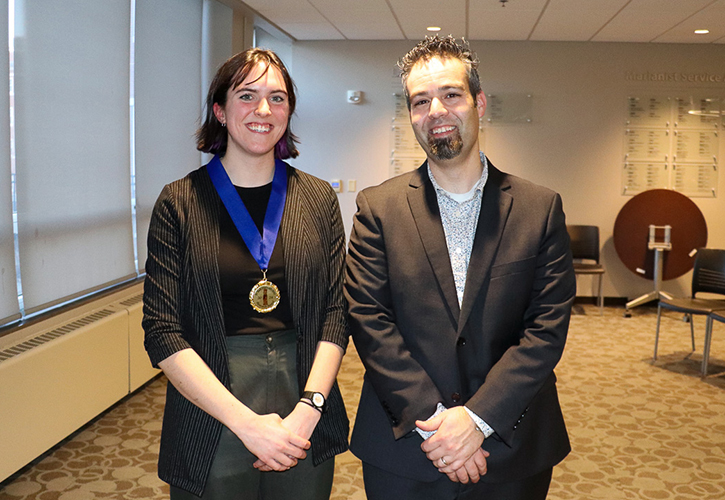College of Arts and Sciences Newsroom
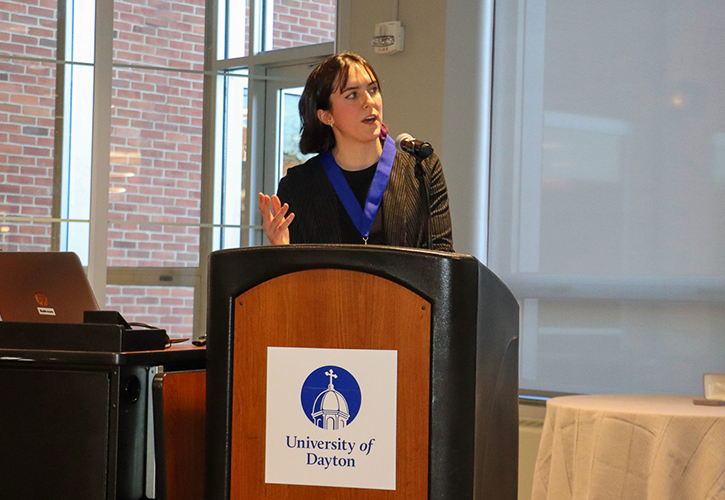
Six UD students honored for research in Catholic Intellectual Traditions
By Kassidy Lammers ’24
Projects ranging from a comparison of ancient flood stories to an analysis of Jordan Peele's 2017 horror film Get Out were honored with 2024 McGrath Awards. The six award winners presented their research at the annual Catholic Intellectual Tradition Symposium Feb. 5-6 in the Kennedy Union Torch Lounge.
The McGrath Award recognizes students whose research in a Common Academic Program (CAP) course demonstrates rigorous, deep and creative engagement with thinkers, texts and/or themes associated with Catholic Intellectual Traditions (CIT). Students received a $750 stipend along with the opportunity to present at the symposium.
“What stands out to me among this year’s excellent McGrath Award-winning projects is the ways they engage with Catholic Intellectual Traditions and how articulate the winners are about the connections in their work,” said Timothy Gabrielli, Gudorf Chair in Catholic Intellectual Traditions and associate professor of theology in UD's Department of Religious Studies.
Gabrielli said the work of each winner is a testament to the importance of CIT at UD and how it is deeply intertwined with the CAP program. Embracing subjects from natural sciences and mathematics to writing and philosophy, the CAP program provides students with an opportunity to engage with CIT outside of coursework directly tied to their major.
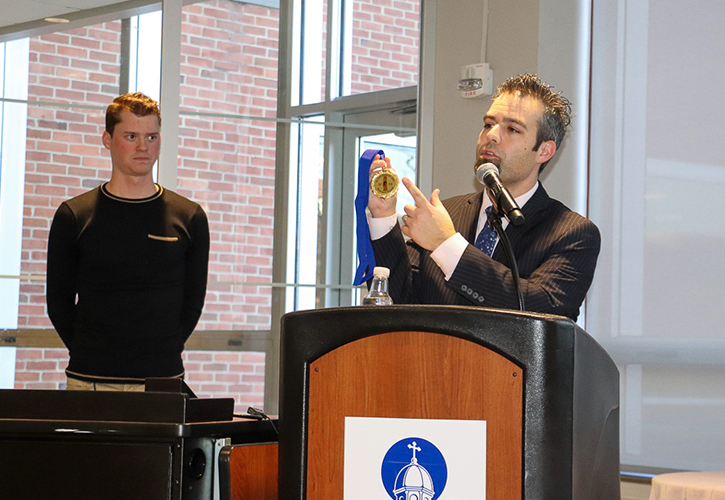
The McGrath Award, named in honor of Fr. Jack McGrath (1935-2015) is sponsored by the Gudorf Chair in Catholic Intellectual Traditions. In 2024, the award recognized three students each in the first-year/sophomore and junior/senior categories. Research projects from spring, summer or fall 2023 CAP courses in any academic discipline were eligible for consideration.
The 2024 awardees:
- Jules Carr-Chellman, a senior philosophy major from Moscow, Idaho. He wrote his research, Visual Rhetoric of the Persecuted Christian Right for the Arguments and Visual Rhetoric of Religious Traditions course with Professor Susan Trollinger.
- Daniel Dunphy, a senior religious studies and theology major from Dayton, Ohio. His research, The Arks of Noah and Utnapishtim, was written for the Pentateuch course taught by Assistant Professor Esther Brownsmith.
- Lucy Waskiewicz, a senior communication and English major from Pittsburgh. She wrote her research, Excavating the Sunken Places: Analyzing Jordan Peele’s Get Out as Apocalyptic Rhetoric Comparable to Greek Hades, for the Road to Hell: The Apocalypse in Classical and Contemporary Forms course with Associate Professor and Assistant Provost for the CAP program Meghan Henning and Lecturer Robert Joseph.
- Alexandra Amrhein, a sophomore English major from Cincinnati. She wrote her research, The Truth Only Dies When True Stories Are Untold: The Story of Reconstruction in New Orleans for the Development of Western Culture in a Global Context course taught by Professor David Darrow.
- Maria Graziano, a junior communication and religious studies major from Slinger, Wisconsin. Graziano wrote her research, The Gift of the Holy Spirit, for the Sacraments course taught by Gabrielli.
- Zachary O’Connor, a mechanical engineering technology major from Pittsburgh. He wrote his research, ‘When Would the Platonist Books Have Taught Me That?’ St. Augustine’s Dance with Neo-Platonic Reasoning, for the Roots and Development of Western Culture in a Global Context course with Associate Professor Anthony Smith.
Dunphy said having his research recognized with a McGrath Award has been a rewarding experience.
“It has been an affirmation of what I have been trying to do throughout my education,” he said. “I have been trying to learn new things and do interesting work that would contribute to the Catholic Intellectual Tradition, so this is really a great honor. It’s very humbling.”
Dunphy’s research examined the flood stories in Genesis and the Epic of Gilgamesh, focusing primarily on a comparison of the construction of the arks in each story. He found that in both stories the arks were representative of the cosmic mountain, which is a motif in ancient Near Eastern religions for a place of safety, sacrifice and connection to god.
Dunphy said his research experience in the Pentateuch course reaffirmed his interests in historical and religious studies.
Waskiewicz said one of her favorite parts of engaging with CIT for her research was how Henning and Joseph pushed her to explore various faith traditions, and how they interact with one another and contemporary media.
“I was so pleasantly surprised with how a Catholic university was able to support the exploration of all these different faith traditions,” she said. “I think that is a huge deal, and helps you explore your own faith traditions as well. It enhances your understanding of the Catholic tradition this school is founded on.”
Waskiewicz’s research compared classical depictions of Hades with Jordan Peele’s Get Out as a piece of apocalyptic rhetoric. What started as a comparison between the Sunken Place realm from the film and Greek depictions of Hades developed into a broader examination of the experiences of the film’s main character, Chris.
“When you analyze Chris’ experience in the context of Hades, it was when he stepped on the property of white people that treated him as ‘other’ that pieces of the film began matching up with classical Hades,” Waskiewicz said.
Educating the whole person is part of UD’s Catholic, Marianist mission. Waskiewicz said winning the McGrath Award is a testament to the value of her educational experience at UD.
“To have my work be recognized and have the University so passionately support the work I did in something that is not adjacent to my major was such a vote of confidence that my education here isn’t just building me to get a career,” she said. “My education is something that is holistic and not only helps my job search, but also who I am as a person.”
For more information on the McGrath Award, visit the Gudorf Chair website.

